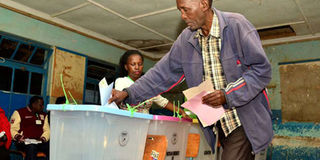For how long will the Kenyans seeking inclusion have to wait?

A voter casts his ballot at Central Primary School polling centre in Kitui Central on August 8, 2017. Kenyans have chosen to use the ballot as their path to a state where these issues of impunity and marginalisation can be redressed. PHOTO | FRANCIS NDERITU | NATION MEDIA GROUP
What you need to know:
- The rush to declare one of the candidates the winner, without complying with the law, is suspicious.
- This election, like all elections since 1992, was about more than numbers or the two main competitors.
Anyone who has been conned, knows a conman/woman, or been the target of an attempted con, knows the routine.
A con emphasises the wrapping that is all silky and shiny, the immaculate presentation and appearance that aims to dazzle.
Most important, it is always done hurriedly, with little time given to think.
PROCEDURE
The harried urges on the many skeptics of these elections to accept the results, arguing that this has been the “best election” ever, and an improvement of 2013 — which incidentally many regime supporters, both national and international, are now admitting was seriously flawed — seem eerily similar to a con.
The rush to declare one of the candidates the winner, without complying with the law, is suspicious.
The KIEMS system was supposed to upload the Form 34As and the numbers at the same time, as ordered by the Court of Appeal, but that did not happen.
FOREIGN AGENCIES
The IEBC, like in 2013, has a ready excuse for violating the law, which it has been doing with impunity since defying the High Court ruling by returning impugned regulations, but keeps getting applauded.
Do not be surprised when the international community defends the IEBC.
They pumped in $85 million — more than Sh8.5 billion — into the IEBC.
Not defending the IEBC would be an admission that they wasted huge resources.
SUPPORT BASE
Of course Messrs Kenyatta and Ruto have significant public support.
But to garner 1.4 million more votes than the opposition? Nyet! Where would those votes come from given they have two core bases — the Gikuyu and Kalenjin — compared to the opposition’s four if you include the Coast to Ukambani, Western and Nyanza regions?
These figures are like a magician pulling a rabbit out of a hat.
We know it is a trick, but until we scrutinize the table and the setup, we can only trust our instincts and rationality.
MARGINALISED
This election, like all elections since 1992, was about more than numbers or the two main competitors.
Elections in Kenya are always about the sense of exclusion for many communities; the reality of marginalisation including of those in dire poverty, and about moving towards a nation-state from diverse tribal communities.
This was not and is not about Raila Odinga. Mr Odinga is simply, at the moment, the symbol of that exclusion, that marginalisation and the desire of many tribes to for recognition and respect.
EXCLUSION
Hence the high stakes; thus the tensions and refusal to accept the shiny con-job that has been perpetrated.
As long as the top leadership in Kenya seems to be the preserve of the Gikuyu and Kalenjin communities, run by tenderpreneurs who gobble up our economy almost as fast as we pay taxes, we will always be in trouble.
As long as some communities feel that they are taken for granted, and not recognised as full Kenyans, no matter that a few from these communities are given soup from the meat that those in charge are scoffing, there will be trouble.
Wisely or not, Kenyans have chosen to use the ballot, and especially the presidential ballot, as their path to a state where these issues of marginalisation, exclusion, impunity and non-recognition can be redressed.
REFORM
We chose the ballot in 1992 and learned that the hegemonic state — as structured by the old constitution — could never allow for transformative ideas to emerge in governance.
This realisation gave momentum to the constitutional reform movement that paralysed the state, peacefully, in 1997 and forced the Kanu regime to making some reforms at the time.
But these reforms were not enough and Kenya was at a standstill until 2002 when the stars lined up and Mwai Kibaki was elected, not as a Gikuyu representative, but as the symbol of the change Kenyans desired, especially the promise to end corruption and promote inclusion.
JUSTICE
Sadly, he squandered that, and then refused to leave power after losing the 2007 elections, resulting in a near civil war which, paradoxically, made a new Constitution necessary and possible.
Twice now since that Constitution, messy predictable elections have failed to be the path to inclusion and transformative change.
How long can those seeking inclusion and remedy to historical injustices wait?
Don’t be surprised if serious — and constitutional — calls for self-determination begin soon.





